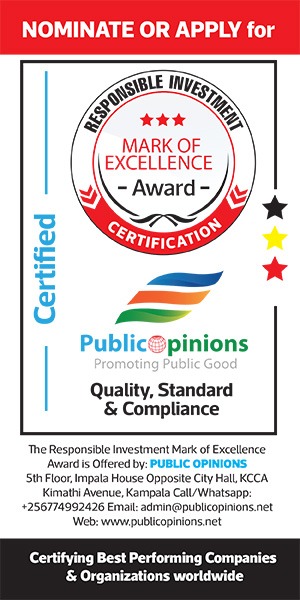
Uganda Wildlife Authority (UWA) IS A CERTIFIED WINNER of the 2016 Uganda Sustainable Development Award in recognition of its contribution towards attainment of Uganda Vision 2040 and United Nations Sustainable Development Goals in Uganda through wildlife conservation,payment of taxes, employment of ugandans,etc.
UWA has transformed into one of the few most responsible public bodies in Uganda with reliable accounting policies,human resource development but above all continuous recruitment and professional development of employees.
H.E Yoweri Kaguta Museveni is working towards transformation of Uganda to a middle income nation.His vision can only be attained for as long as public institutions such as Ministries,Authorities and commissions have committed themselves to the aspirations of H.E the President.
Unfortunately many public bodies in Uganda are not yet committed to attain Uganda Vision 2040 and United Nations Sustainable Development Goals. We applaud Uganda Wild Life Authority for being a Responsible Organisation.
Understanding UWA;
Executive Director:Dr. Andrew Ggunga Seguya Since 22nd November 2012
Uganda Wildlife Authority (UWA) is a semi-autonomous government agency that conserves and manages Uganda’s wildlife for the people of Uganda and the whole world. This agency was established in 1996 after the merger of the Uganda National Parks and the Game Department, and the enactment of the Uganda Wildlife Statute, which became an Act in 2000. UWA is mandated to ensure sustainable management of wildlife resources and supervise wildlife activities in Uganda both within and outside the protected areas.
With 10 national parks and 12 wildlife reserves under its jurisdiction, UWA’s role in managing the country’s tourism industry and attracting investors to the sector has been a significant one. It also manages five community wildlife management areas and 13 wildlife sanctuaries. The challenges facing the management and conservation of wildlife and biodiversity in Uganda are myriad, and they include poaching, competition in the regional tourism market, human wildlife conflict and wildlife crimes.
Stakeholders, partners and communities that live around these protected areas have been employed to help tackle some of these issues. The organization has also developed strategies within its management policies to help solve some of these challenges.

Vision
“To be the leading, self-sustaining wildlife conservation agency that transforms Uganda into one of the best ecotourism destinations in Africa.”
Mission
“To conserve, economically develop and sustainably manage the wildlife and protected areas of Uganda in partnership with neighboring communities and other stakeholders for the benefit of the people of Uganda and the global community.”
Uganda Wildlife Act
Wildlife management in Uganda was once the responsibility of the government alone. However, as concern grew about how wildlife management would be achieved without support from district authorities, communities and the private sector, there was the need to involve other stakeholders. This gave birth to the Wildlife Use Rights.
Wildlife Use Rights are some of the ways in which UWA motivates communities to sustainably manage wildlife on both communal and private land. There are six classes of Wildlife Use Rights: hunting, farming, ranching, trading, educational and research and general extraction use rights. This program is based on the principle that economic benefits from wildlife can lead to better custodianship of wildlife resources. Examples of this are Lake Mburo National Park and Kabwoya Wildlife Reserve, where wildlife numbers have increased since the sport hunting program was launched.
Communities in these regions have realized that there are greater rewards from the animal fees paid by the sport hunters than there were from poaching. In addition to the financial benefits, all the meat is left for the communities. In one district, a boarding primary school was funded by sport hunting.
Awarded and Accredited by;
Public Opinions International
Plot 30 Suite 5, Level 4 Green Land Tower
Opposite Bank of Uganda Kampala Road
P.o Box 35297 Kampala-Uganda
Tel: 256 701 992 426
Email:[email protected]
Web: www.pubopinions.org


















